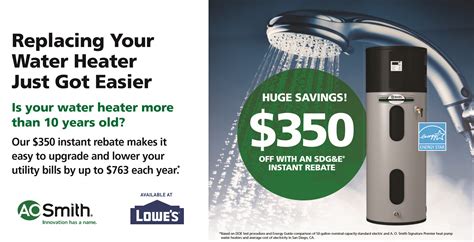In the quest for energy efficiency and reduced utility bills, upgrading to an electric water heater is a smart choice for homeowners. However, the upfront cost can be intimidating. Fortunately, many governments and agencies offer electric water heater rebates to help offset these expenses. This guide will take you through electric water heater rebates, how to access them, and tips on choosing the right heater for your home.
Understanding Electric Water Heater Rebates
Electric water heater rebates provide financial incentives primarily to encourage homeowners to upgrade to energy-efficient models. These rebates can come from various sources, including federal, state, and local governments, and utility companies. The primary goals of these programs are to:
- Reduce energy consumption
- Lower greenhouse gas emissions
- Encourage the adoption of modern, energy-efficient technologies
Types of Electric Water Heaters Eligible for Rebates
Not all electric water heaters are eligible for rebates. Most rebate programs focus on energy-efficient models that meet specific efficiency standards. Here are a few types commonly eligible for rebates:
1. Heat Pump Water Heaters
Heat pump water heaters use electricity to move heat rather than generate it directly. This technology can be significantly more efficient than traditional electric water heaters, making them a popular choice for rebate programs.
2. Solar Water Heaters
Although primarily reliant on solar energy, these systems often have electric backup elements that qualify for rebates. Combining solar energy with electric systems maximizes efficiency.
3. Tankless Water Heaters
Tankless water heaters, which heat water on demand, can also qualify for rebates. They eliminate standby heat loss associated with traditional tank systems, providing additional energy savings.
How to Find Electric Water Heater Rebates
Accessing rebates can involve some research. Here’s how to proceed:
1. Check with Local Utility Companies
Many utility providers offer rebates directly through their programs. Visit their website or call their customer service to find out about available rebates for electric water heaters.
2. State and Local Government Programs
Rebates may also be available at the state or local government level. Websites like the Database of State Incentives for Renewables and Efficiency (DSIRE) provide comprehensive information on incentives available by state.
3. Federal Incentives
The federal government occasionally offers tax credits that can apply to energy-efficient home improvements, including water heaters. Be sure to check for the most current information regarding eligibility and requirements.
4. Product Manufacturers
Some manufacturers offer rebates or incentives for buying specific models. Always consult the manufacturer’s website to see if any incentives are available.
Steps to Apply for Rebates
Once you’ve identified a suitable rebate program, follow these steps to apply:
1. Purchase an Eligible Water Heater
Ensure the model you choose meets the efficiency requirements outlined by the rebate program.
2. Keep Your Documentation
Save all purchase receipts, warranty information, and product specifications. This documentation is often required during the rebate application process.
3. Complete the Application
Fill out the application form provided by the rebate program. Be thorough and accurate to avoid delays in processing.
4. Submit Your Application
Send your application and supporting documents as outlined by the program’s guidelines. Make sure to keep copies for your records.
Choosing the Right Electric Water Heater for Your Home
When upgrading your water heater, several factors should influence your choice, including:
1. Energy Efficiency
Look for the Energy Star label on water heaters, as this indicates compliance with efficiency standards. Higher efficiency can lead to lower utility bills.
2. Capacity/Size
Choose a water heater that meets your household’s needs. Consider the number of occupants and peak usage times to select the appropriate capacity.
3. Installation Costs
Don’t just focus on the price of the unit; consider installation fees, which can vary based on the complexity of the job.
Conclusion
Upgrading to an electric water heater can significantly lower energy costs while improving home efficiency. By taking advantage of available rebates, homeowners can lessen the financial burden associated with purchasing a new unit. Remember to research eligible models, local programs, and follow the application processes carefully to maximize your savings.
FAQs
1. How much can I save through electric water heater rebates?
Rebate amounts vary widely depending on your location and the specific model of the water heater. Savings can range from a few hundred dollars to over a thousand, depending on local programs.
2. How do I know if a water heater is eligible for rebates?
Check for the Energy Star label and consult your local rebate program’s eligibility guidelines to ensure you’re selecting an approved model.
3. Can I apply for multiple rebates?
It’s possible to qualify for multiple rebates depending on the programs available in your area. However, ensure you read the terms and conditions carefully to avoid disqualification.
4. Is the application process difficult?
The application process can vary. Generally, it involves submitting an application form and supporting documentation, which is straightforward if you follow the provided instructions closely.
5. How often do rebate programs change?
Rebate programs can change frequently based on regulatory updates and available funding. Regularly checking local utility and government websites will keep you informed.
This article provides an in-depth look at electric water heater rebates, including how to find them, apply for them, and choose the right water heater. The conclusion and FAQs sections provide further clarity for readers considering this energy-efficient investment.
Download Electric Water Heater Rebates
